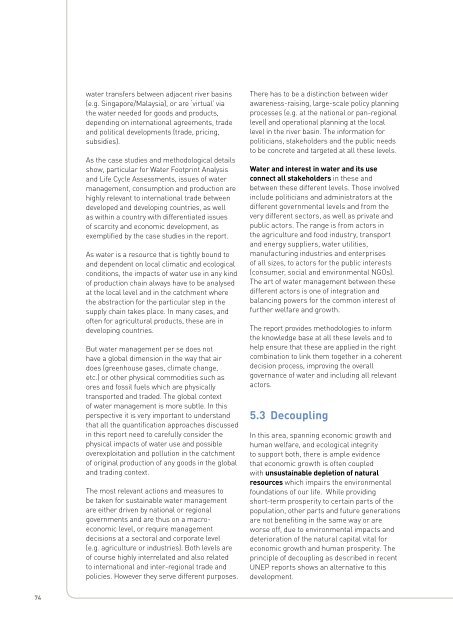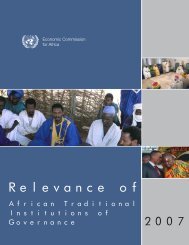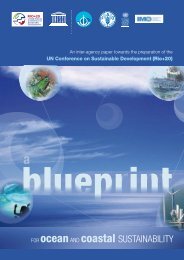MEASURING WATER USE IN A GREEN ECONOMY - UNEP
MEASURING WATER USE IN A GREEN ECONOMY - UNEP
MEASURING WATER USE IN A GREEN ECONOMY - UNEP
You also want an ePaper? Increase the reach of your titles
YUMPU automatically turns print PDFs into web optimized ePapers that Google loves.
water transfers between adjacent river basins<br />
(e.g. Singapore/Malaysia), or are ‘virtual’ via<br />
the water needed for goods and products,<br />
depending on international agreements, trade<br />
and political developments (trade, pricing,<br />
subsidies).<br />
As the case studies and methodological details<br />
show, particular for Water Footprint Analysis<br />
and Life Cycle Assessments, issues of water<br />
management, consumption and production are<br />
highly relevant to international trade between<br />
developed and developing countries, as well<br />
as within a country with differentiated issues<br />
of scarcity and economic development, as<br />
exemplified by the case studies in the report.<br />
As water is a resource that is tightly bound to<br />
and dependent on local climatic and ecological<br />
conditions, the impacts of water use in any kind<br />
of production chain always have to be analysed<br />
at the local level and in the catchment where<br />
the abstraction for the particular step in the<br />
supply chain takes place. In many cases, and<br />
often for agricultural products, these are in<br />
developing countries.<br />
But water management per se does not<br />
have a global dimension in the way that air<br />
does (greenhouse gases, climate change,<br />
etc.) or other physical commodities such as<br />
ores and fossil fuels which are physically<br />
transported and traded. The global context<br />
of water management is more subtle. In this<br />
perspective it is very important to understand<br />
that all the quantification approaches discussed<br />
in this report need to carefully consider the<br />
physical impacts of water use and possible<br />
overexploitation and pollution in the catchment<br />
of original production of any goods in the global<br />
and trading context.<br />
The most relevant actions and measures to<br />
be taken for sustainable water management<br />
are either driven by national or regional<br />
governments and are thus on a macroeconomic<br />
level, or require management<br />
decisions at a sectoral and corporate level<br />
(e.g. agriculture or industries). Both levels are<br />
of course highly interrelated and also related<br />
to international and inter-regional trade and<br />
policies. However they serve different purposes.<br />
There has to be a distinction between wider<br />
awareness-raising, large-scale policy planning<br />
processes (e.g. at the national or pan-regional<br />
level) and operational planning at the local<br />
level in the river basin. The information for<br />
politicians, stakeholders and the public needs<br />
to be concrete and targeted at all these levels.<br />
Water and interest in water and its use<br />
connect all stakeholders in these and<br />
between these different levels. Those involved<br />
include politicians and administrators at the<br />
different governmental levels and from the<br />
very different sectors, as well as private and<br />
public actors. The range is from actors in<br />
the agriculture and food industry, transport<br />
and energy suppliers, water utilities,<br />
manufacturing industries and enterprises<br />
of all sizes, to actors for the public interests<br />
(consumer, social and environmental NGOs).<br />
The art of water management between these<br />
different actors is one of integration and<br />
balancing powers for the common interest of<br />
further welfare and growth.<br />
The report provides methodologies to inform<br />
the knowledge base at all these levels and to<br />
help ensure that these are applied in the right<br />
combination to link them together in a coherent<br />
decision process, improving the overall<br />
governance of water and including all relevant<br />
actors.<br />
5.3 Decoupling<br />
In this area, spanning economic growth and<br />
human welfare, and ecological integrity<br />
to support both, there is ample evidence<br />
that economic growth is often coupled<br />
with unsustainable depletion of natural<br />
resources which impairs the environmental<br />
foundations of our life. While providing<br />
short-term prosperity to certain parts of the<br />
population, other parts and future generations<br />
are not benefiting in the same way or are<br />
worse off, due to environmental impacts and<br />
deterioration of the natural capital vital for<br />
economic growth and human prosperity. The<br />
principle of decoupling as described in recent<br />
<strong>UNEP</strong> reports shows an alternative to this<br />
development.<br />
74

















